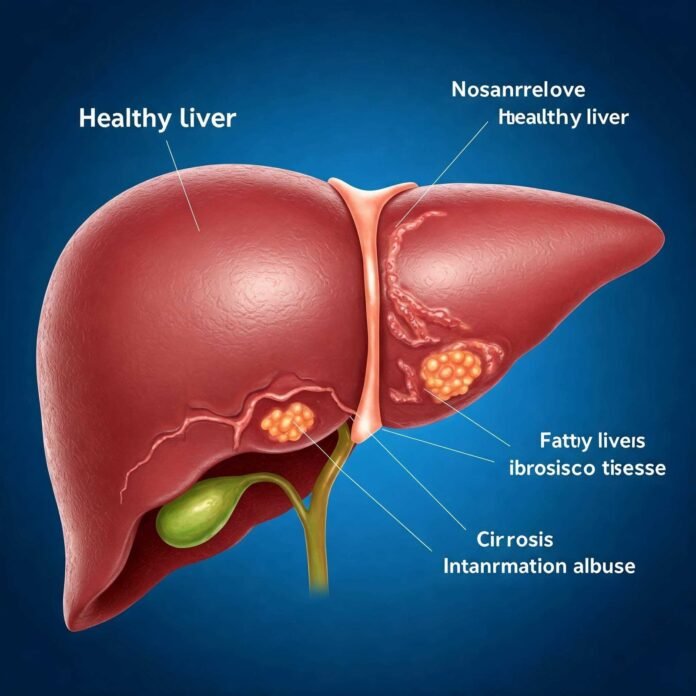Alcohol affects your liver in ways that, like, hit me like a truck, yo. I’m typing this in my chaotic Denver apartment, surrounded by empty seltzer cans (for the hangover hustle), a pile of bar receipts I’m too stressed to check, and, for real, a sink full of whiskey glasses I swore I’d wash after my last “just one drink” night. My cat’s batting at a stray bottle cap, and my phone’s buzzing with notifications from a health app I forgot I downloaded. I’m 30, slinging retail while pretending I’m chill about my health, tryna wrap my head around booze and liver health in 2025. So, here’s my sloppy, embarassing take on how alcohol affects your liver: what you need to know, packed with my dumb drinking mistakes and alcohol liver damage lessons I’ve learned the hard way—prolly spilled whiskey on my couch again, oops.
Why Alcohol Affects Your Liver (And Why I’m Lowkey Panicking)
I’m legit awful at moderating my drinking and liver function game. Like, I once chugged three beers at a BBQ thinking my liver was “fine”—yep, I was googling “liver pain” at 3 a.m. while eating leftover tacos in my car. But, real talk, alcohol affects your liver big time, with Mayo Clinic saying heavy drinking can lead to fatty liver or worse. That’s enough to make me rethink my happy hour habit, for real. So, these liver-friendly drinking tips are my shot at keeping my nights fun without my liver throwing a fit. Also, I might’ve typed “lever” instead of “liver” in my notes—classic me.

7 Things I Learned About How Alcohol Affects Your Liver
Alright, here’s my rundown of seven alcohol affects your liver facts and tips, based on my freaked-out research and some legit sources I dug up while stress-sipping. I’ve tried some, botched others, and, yeah, learned a bit through my mess-ups.
Dumb Move: I googled “liver pain” instead of seeing a doc.
Alcohol Hits Hard: Booze makes your liver work overtime to break it down. WebMD explains it (check WebMD).
My Dumb Moment: I thought “just one more” wouldn’t hurt. Spoiler: my liver disagreed.
Fatty Liver Risk: Heavy drinking can cause fat buildup. Healthline’s got details (see Healthline).
Cringe Alert: I bragged about my “high tolerance” and then felt weirdly tired.
Moderation Is Key: Stick to one drink a day for women, two for men. CDC recommends it (check CDC).
Oops: I had three whiskeys and woke up feeling like trash.
Hydrate Like Crazy: Water helps your liver process booze. Cleveland Clinic backs this (see Cleveland Clinic).
My Fail: Skipped water, ended up dehydrated and paranoid.
Eat Before Drinking: Food slows alcohol absorption. Harvard Health says so (see Harvard Health).
Embarassing Bit: Drank on an empty stomach and tried to “dance off” the buzz. Fell over.
Take Booze Breaks: Give your liver a rest with dry days. Mayo Clinic suggests it (check Mayo Clinic).
My Mess: Ignored dry days and felt sluggish for a week.
Check Your Health: Get liver tests if you drink a lot. NIH has info (see NIH).

How I Keep Screwing Up Alcohol and Liver Health
Okay, booze and liver health is not my strong suit, no cap. Like, I once spent hours on X scrolling “alcohol health risks 2025” instead of cutting back—classic procrastination move that left me with a $50 bar tab and a hypochondriac meltdown. Nevertheless, here’s what I’ve figured out from my chaos:
- Cut Back Early: I kept thinking “one more” was fine and felt off for days. So, limit drinks, yo.
- Eat First: I drank without eating and felt queasy. Food’s your friend, for real.
- Ask for Advice: I DM’d a health nerd on X, and they dropped dope liver-friendly drinking tips. Network, y’all.
- Listen to Your Body: I ignored feeling tired and kept drinking. Check in with yourself.
Healthline says moderate drinking can save your liver a lot of stress, and I’m tryna get there without freaking out again (see Healthline). Oh, and I just knocked over a seltzer can—great, more mess.
Finding Your Own Alcohol and Liver Health Groove
Figuring out alcohol affects your liver is, like, picking the right taco topping—personal, tricky, and a lil’ scary. Here’s my advice, straight from my taco-crumb-covered couch (and a spilled seltzer, oops):
- Know Your Limits: I stick to one drink now to chill my liver out. What’s your vibe?
- Start Small, Dude: Don’t chug a bottle in one night. I did and, for real, my body hated me. Try sipping slow.
- Use Cool Resources: WebMD and Mayo Clinic got dope alcohol liver damage info. NIH’s stuff is clutch too.
- Track Your Health: I started noting how I feel after drinking—nerdy, but it keeps me from spiraling.

Wrapping Up My Alcohol Affects Your Liver Chaos
So, yeah, I’m still a hot mess with alcohol affects your liver, sitting here in my Denver chaos with my cat judging my boozy, anxious life. I’ve freaked out over Google searches, scarfed too many tacos while stressing, and, for real, still forget to hydrate half the time. But, like, these liver-friendly drinking tips have kept me from totally losing it. Check out WebMD or Mayo Clinic for more booze and liver health advice if you’re curious (WebMD, Mayo Clinic). Anyway, I’m just tryna sip smarter without my liver ghosting me.




































